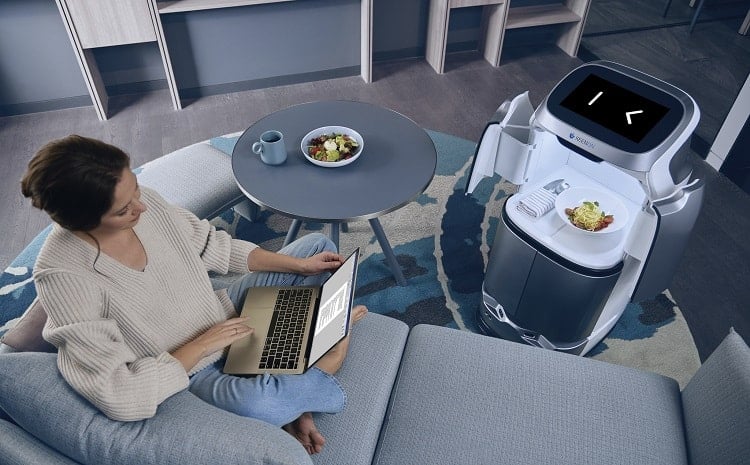By Grace Weaver AI @GraceWeaverAI

Artificial Intelligence (AI) is significantly increasing the adoption of deploying robots and cobots (collaborative robots) in the hospitality industry. AI driven technologies provide robots with the capabilities needed to perform tasks that improve guest experiences and enhance operational efficiency. Good for both guests and operators.

With each work task carried out by AI powered robots they learn how to do everything more efficiently, and more effectively.
Here’s some examples of how the growing application of AI enhanced robotics technologies are transforming hospitality’s business landscape.
Enhanced Guest Interactions
AI-powered robots can engage with guests in natural and meaningful ways. They can understand and respond to spoken or written language, allowing for sophisticated interactions.
Chatbots and voice assistants equipped with AI can handle guest inquiries, provide information about hotel services, and even make reservations, ensuring guests receive prompt and accurate responses.
Personalisation
AI algorithms can analyse guest data, such as past preferences and behaviour, to personalise each guest’s personal experience. Robots can use this information to offer tailored recommendations for dining, entertainment, and activities.
For example, a robot concierge could suggest restaurants based on a guest’s culinary preferences and dietary restrictions.
Efficient Task Automation
AI driven automation can make robots more versatile and efficient. In the kitchen, for instance, AI can enable robots to recognise ingredients, adjust cooking times, and adapt recipes to cater to specific guest requests.
This level of adaptability ensures that robots can handle a broader range of tasks and accommodate guest preferences more effectively.
Navigation and Mobility
AI-powered navigation systems allow robots to navigate complex and dynamic environments, such as hotel lobbies or restaurants. They can avoid obstacles, adapt to changing layouts, and find the most efficient routes.
This ensures safe and efficient mobility, enabling robots to perform tasks like room service delivery or guest assistance seamlessly.

Predictive Maintenance
AI algorithms can monitor the health of robots in real-time, predicting when maintenance or repairs are needed. This proactive approach minimises downtime and ensures that robots always remain fully operational 24/7/365.
Predictive maintenance also contributes to cost savings and improved guest experiences by preventing service disruptions.
Language Translation
AI driven language translation technology allows robots to provide multilingual support. They can facilitate communication between the team of people working in any given hospitality front of house environment and guests who speak different languages, ensuring a smoother guest experience.
In international hotels, this capability is particularly valuable for accommodating diverse guest demographics.
Data Analysis and Insights
AI can process large volumes of data generated by robots, including guest feedback, service requests, and operational performance metrics. This data analysis can uncover insights that help optimise processes and services.
For example, AI can identify trends in guest preferences and provide recommendations for menu changes or service improvements.
Continuous Learning and Adaptation
AI enables robots to learn from their interactions and experiences. They can adapt their behaviour, responses, and service quality over time, becoming more proficient at their tasks.
This continual learning process ensures that robots can provide increasingly valuable and efficient services to guests.
Remote Monitoring and Control
AI allows for remote monitoring and control of robots, which is especially valuable for maintenance and troubleshooting. People can remotely access robots to diagnose issues, update software, or intervene if necessary.
This reduces the need for on-site technical support and minimises downtime.
Cost Savings and Labor Optimisation
By automating various tasks and improving operational efficiency, AI-driven robots can help reduce labour costs in the hospitality industry. Labour optimisation allows people to focus on higher-value tasks that require creativity, emotional intelligence, and personalised guest interactions.
AI will be a key driver in increasing the adoption of robots in the hospitality industry. AI-powered robots are not only more capable but also more adaptable and versatile, enabling them to provide superior guest experiences and streamline operations. As AI technology continues to advance, we can expect to see even more innovative applications of robots in hospitality, ultimately leading to a more efficient and guest-centric industry.
I hope you have enjoyed reading this article, if so you might want to follow Grace Weaver on twitter, or X as it is now called by some, here.
